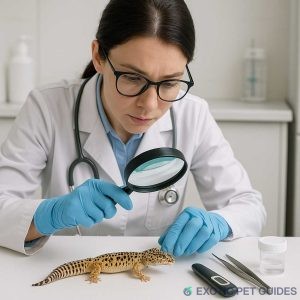Geckos are fascinating and resilient creatures, but just like any pet, they require attentive care to stay healthy and thrive. Whether you’re caring for a Leopard Gecko, Crested Gecko, or any of the many gecko species, understanding their health needs is essential to providing a safe, comfortable, and enriching environment.
In this guide, we’ll cover everything you need to know to keep your gecko in top condition—from signs of illness and nutrition tips to ideal habitat setup and vet care.

🧠 Understanding Gecko Biology
Before diving into care, it helps to understand what makes geckos unique:
- Ectothermic: Geckos rely on external heat sources to regulate body temperature.
- Insectivores: Most geckos eat live insects as their primary food source.
- Tail Storage: Their tails store fat and nutrients, which can be a sign of overall health.
🏡 Habitat: The Foundation of Health
✔️ Ideal Enclosure Conditions
A well-maintained habitat helps prevent stress and disease.
- Tank Size: Minimum 10–20 gallons per gecko (species-dependent)
- Substrate: Use safe options like reptile carpet, tile, or paper towels. Avoid loose substrates like sand that can cause impaction.
- Temperature Gradient: Provide a warm side (88–92°F) and a cool side (72–75°F)
- Humidity: Varies by species; Leopard Geckos (30–40%), Crested Geckos (50–70%)
- Lighting: Not all geckos need UVB, but a light cycle (12 hours light/dark) helps regulate behavior and metabolism
🍽️ Nutrition: Feeding for Vitality
🦗 Recommended Foods
- Staples: Crickets, mealworms, dubia roaches
- Treats: Waxworms, hornworms, silkworms
- For Frugivores (like Crested Geckos): Commercial fruit-based gecko diets + occasional fruit puree
💊 Supplementation
- Calcium: Dust insects 3–4 times/week
- Vitamin D3: 1–2 times/week (especially important if UVB light is absent)
- Multivitamin: Once a week to fill dietary gaps
🕓 Feeding Schedule
- Juveniles: Daily
- Adults: 3–4 times a week
- Always remove uneaten food after feeding
🩺 Common Gecko Health Issues
⚠️ Signs of Illness
- Lethargy or unresponsiveness
- Refusing food for more than a week
- Rapid weight loss or thin tail
- Labored breathing or wheezing
- Retained shed (especially on toes or eyes)
- Cloudy or sunken eyes
- Discoloration or swelling of the mouth or belly
🧪 Common Conditions
| Condition | Cause | Prevention |
|---|---|---|
| Impaction | Ingested substrate | Use safe flooring, avoid loose sand |
| Metabolic Bone Disease (MBD) | Calcium/Vitamin D3 deficiency | Regular supplementation |
| Respiratory Infection | Cold/humid conditions | Proper temperature & humidity |
| Parasites | Contaminated food or poor hygiene | Quarantine new pets, clean enclosure regularly |
| Mouth Rot | Bacterial infection | Clean tank, vet care if symptoms appear |
🧼 Hygiene and Maintenance
- Spot Clean Daily: Remove waste and uneaten food
- Full Clean Weekly: Replace substrate, sanitize tank decor
- Water: Always provide clean, fresh water (even if they rarely drink)
👩⚕️ When to See a Vet
You should consult a reptile-experienced veterinarian if:
- Your gecko refuses food for 10+ days
- There’s visible swelling, bleeding, or abnormal shedding
- You suspect parasites or MBD
- They experience a sudden change in behavior or weight
Annual check-ups can also help catch issues early.
🧍 Handling and Behavior
💡 Tips for Healthy Interaction
- Always handle gently, especially around the tail
- Let them walk across your hand rather than grabbing them
- Limit handling to 5–10 minutes, especially for new or young geckos
- Signs of stress: squeaking, tail twitching, or trying to flee
✅ Gecko Health Checklist
- Eating regularly
- Pooping normally
- Clear, alert eyes
- Strong, thick tail
- Smooth, clean skin
- Active and responsive behavior
- No signs of mites, swelling, or retained shed
📝 Final Thoughts
Geckos may be low-maintenance compared to some pets, but they are not no-maintenance. Proper habitat, diet, and regular observation are key to a long, healthy life. With good care, many gecko species can live 10 to 20 years, becoming loyal companions and fascinating creatures to watch.
Invest time in understanding your gecko’s needs—it’s the best way to ensure a vibrant, happy reptile and peace of mind for you as an owner.

